Travel trailers are a perfect way to enjoy the great outdoors while enjoying all the comforts of home. These trailers use a battery to power various systems, and it’s essential to understand what runs off the battery in a travel trailer. With that in mind, this blog will explore various systems that rely on the battery and what to do if the battery runs out of power.
Table of Contents
Travel Trailer Battery: What It Is And How It Works
Travel trailers are excellent vehicles to venture places without the hassle of luggage restrictions, lodging availability, and scheduling. However, while these vehicles offer you a lot of freedom and convenience, it is important to understand and maintain the technical aspects of your trailer’s design. And the battery of your travel trailer is one of the most important components that you should understand and take care of. Let’s discuss the travel trailer battery, what it is, and how it works.
Firstly, Travel Trailer Batteries are a type of battery designed to store and supply electric power for travel trailers. They are rechargeable and are located somewhere within the trailer. There are several types of batteries that travel trailers use. The most common are deep cycle batteries such as Flooded, AGM, and Lithium-Iron Phosphate. However, each type has different characteristics and functionalities, and it is essential to understand these differences in order to choose the right type of battery for your travel trailer.
Secondly, in terms of functionality, when the travel trailer is connected to an electric hookup (shore power), the battery will automatically recharge. However, if the trailer is not connected to a power source, the battery will drain, providing power to the trailer’s lights, appliances, and other components. The battery can also be recharged using a generator, rooftop solar panel, or portable solar panel.
Fourthly, it’s important to take safety precautions when dealing with batteries. Always wear gloves and be cautious to prevent any metal objects from touching both terminals of the battery at the same time. Always use approved battery chargers and follow safety instructions. Batteries also emit hydrogen gas when being charged, and adequate ventilation should be provided.
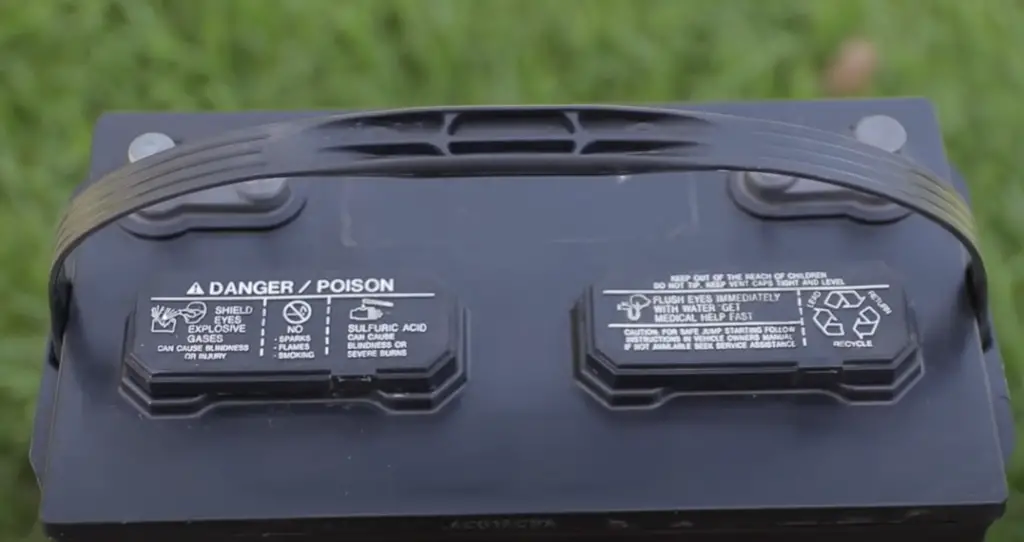
Lastly, if you’re uncertain about how to care for your travel trailer battery or if you’re looking to replace it, it’s always a good idea to rely on a professional to help you choose the right battery, ensure proper installation, and provide maintenance advice.
Travel trailer batteries are an essential component of your travel trailer. It is important to understand how they function, the different types that are available, and how to properly care for them to ensure a long lifespan. Regular maintenance will help keep your travel trailer battery in working order, and prevent battery failure.
Types of Travel Trailer Batteries
If there is one essential item that travel trailers cannot function without, it’s a reliable battery. Without a battery, you won’t be able to run your lights, air conditioner, or any other appliance on board. It can be challenging to choose a travel trailer battery, especially if you don’t know much about the different types available. However, with the right information on the types of travel trailer batteries, you can make an informed decision on what type of battery best suits your needs.
1) Deep Cycle Batteries: These are the most common type of battery used in travel trailers. They are designed for frequent deep discharges and recharging. They are available in different capacities ranging from 100 to 400 amp-hour. They are ideal for powering appliances like refrigerators, air conditioners, and lights. [1]
2) Flooded Batteries: These types of batteries have been around for a long time, and they are often referred to. These batteries require maintenance to ensure longevity since they contain liquid electrolytes that can evaporate over time. Failure to check and top-up the liquid electrolytes can cause the battery to fail prematurely. However, they are the most economical type of battery for travel trailers.
3) Gel Batteries: They function similarly to flooded batteries but come equipped with a gel electrolyte instead of a liquid one. They are maintenance-free, require no topping up of the electrolyte level, and are less prone to leakage or damage. However, they are costlier than flooded batteries. [2]
4) AGM Batteries: AGM (Absorbed Glass Matt) batteries are the most advanced type of battery technology in the world of travel trailers. They have high performance, are maintenance-free, and can tolerate deep discharges frequently. They also have fast recharge time, which is very beneficial for those who frequently use their travel trailers. However, they are the most expensive type of battery, given the high-level technology they employ. [1]
5) Lithium-ion Batteries: Lithium-ion batteries are the latest in battery technology and come with many advantages. They are lighter, more efficient than other battery types, have a longer lifespan and charge faster. They are ideal for the modern travel trailer owner who requires the best of everything. However, lithium-ion batteries are the costliest type of battery and will require specialized care and potential modifications to the trailer’s existing battery and charging system. [2]
With this information on the types of travel trailer batteries, you are well-equipped to make an informed decision on what type of battery best suits your needs. Each type has its advantages and disadvantages and finding a balance between these is essential. However, investing in a quality battery is critical to ensure an enjoyable travel trailer experience, and proper battery storage procedures and maintenance will help to prolong battery life.
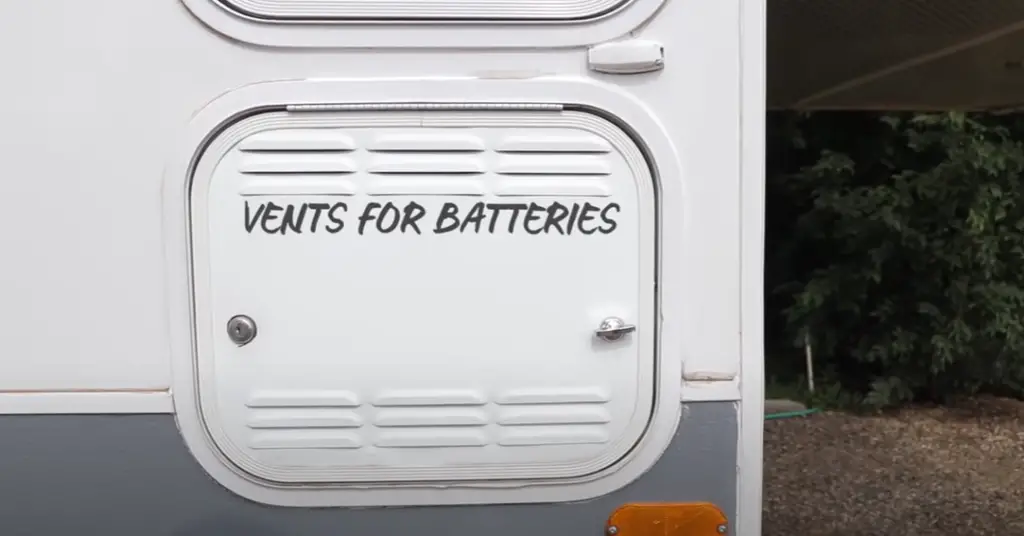
TOP Brands of Travel Trailer Batteries and Their Benefits
The batteries are an essential component of your trailer’s electrical system and they should be selected carefully to ensure you have enough power for all your adventures. With so many brands on the market, it can be overwhelming to choose the right option for your travel trailer. Here we will dive into the top brands of travel trailer batteries and their benefits.
- Optima Batteries
Optima Battery is one of the most popular brands of travel trailer batteries. The batteries are known for their superior performance and long lifespan. They come in various sizes for different applications and have a sealed, maintenance-free design, making them ideal for off-road and marine vehicles. Optima batteries are also resistant to extreme temperatures and shock, which is perfect for outdoor adventures.
- Trojan Batteries
Trojan Batteries is another well-known brand in the industry devoted to travel trailer batteries. Their batteries are known for their durability, deep-cycle performance, and long lifespan. They are specifically designed for demanding outdoor applications and come in various sizes to fit different trailer battery boxes. Trojan batteries also have a low discharge rate which makes them perfect for long-term storage, ensuring they will be ready when you need them.
- Interstate Batteries
This manufacturer’s products are one of the most trusted in the industry, providing reliable and long-lasting power solutions for various applications. They are known for their powerful performance and deep cycling capabilities, making them perfect for use in travel trailers. The batteries are also designed to withstand extreme temperatures and vibrations, which is perfect if you plan on traveling down rough terrain.
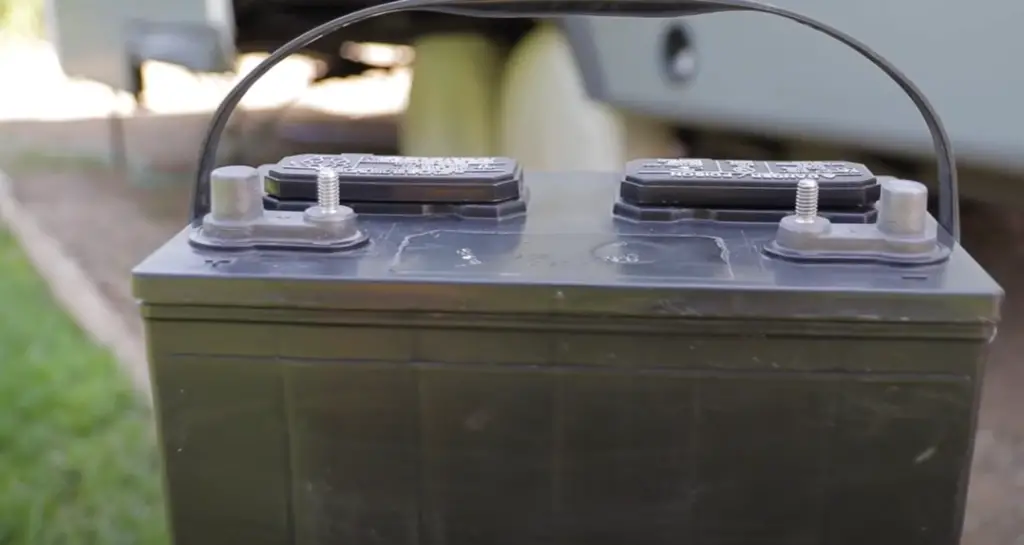
- Renogy Batteries
Renogy Batteries are designed for off-grid adventurers and those who love to camp in remote locations. They produce high-quality batteries that have a long lifespan and deep-cycle performance, which means they can sustain camping adventures without requiring frequent recharging. Renogy Batteries also have a high resistance to over-discharging, which means they won’t suffer damage when kept unused for a long time.
- Battle Born Batteries
These are perfect for those who want to save on weight and space. They have a lightweight, compact design, and offer superior performance to traditional lead-acid batteries. They are also safe and non-toxic, making them an eco-friendly option.
What Will the RV Battery Run?
Your RV’s battery is a crucial component, powering everything from the lights and appliances to the water pump and entertainment system. That said, one question that frequently arises from RV owners is, “what will the RV battery run?”. Let’s explore everything you need to know about what your RV battery will run, and why it’s essential to manage your power supply when living off the grid.
Running appliances:
If you’re planning on taking your RV off the grid, you need to be careful about the appliances you use. Your RV battery only has a limited amount of capacity, so using appliances that draw too much power can quickly drain the battery and leave you powerless. When it comes to appliances, the biggest culprits are usually anything that generates heat, such as ovens, stoves, and even hair dryers. Small appliances like televisions, phone chargers, and laptops typically have a lower draw, making them more suitable for use off the grid.
Powering the Water Pump:
One critical function of your RV’s battery is powering the water pump. The water pump is responsible for drawing water from your RV’s freshwater tank and delivering it to the faucets, toilet, and shower. It’s essential to keep an eye on your water usage, especially when off the grid, to ensure that you don’t drain your battery. A good rule of thumb is to only turn on the pump when you need to use the water and to use low-flow faucets to conserve water.
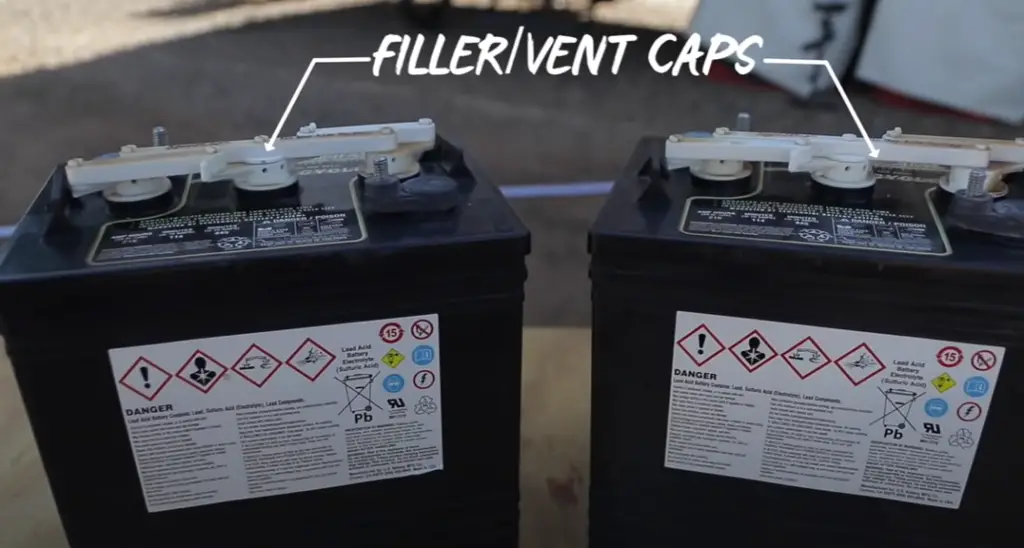
Interior and Exterior Lighting:
Interior and exterior lighting can quickly drain your RV battery if you’re not careful. When it comes to lighting, LED lights are an excellent option for off-grid use, as they require far less power than traditional incandescent bulbs. To further conserve battery power, be sure to switch off lights in rooms you’re not using and only use exterior lights when necessary for safety.
Entertainment:
When it comes to on-the-road entertainment, your RV battery can power televisions, radios, and even gaming consoles. However, it’s essential to manage your power usage and be careful not to drain your battery too quickly by using power-hungry technologies like satellite television or gaming computers.
Charging Devices:
Charging devices, like smartphones, tablets, and laptops is usually something we take for granted when living in a traditional home. However, when living off the grid in an RV, it’s essential to be mindful of your device charging needs. While it’s easy to go to a café or coffee shop to charge your devices when on a day trip, on long journeys, charging devices within the RV becomes a necessity. Make sure your devices are fully charged before leaving, and consider purchasing solar chargers or charging devices with smaller battery capacities.
Managing your RV’s battery is a crucial aspect of living off the grid. Knowing what your RV battery will run can help you make informed decisions about appliances, lighting, entertainment, and water usage, ensuring that you always have enough power to enjoy comfortable RV living. Being mindful of your power consumption and making a few simple changes in the way you use your RV can make all the difference when living off the grid. So go ahead, hit the open road, and enjoy the adventure!
Reasons Why a Travel Trailer Battery May Run Off
Are you planning a road trip with your travel trailer but feeling a little anxious about the battery? It’s a common concern for many owners because the battery powers everything from the lights to the fridge. If your battery runs out of juice, your trip will come to an abrupt halt. So why does a travel trailer battery run off? Here, we are discussing the top reasons and provide solutions to ensure your battery doesn’t let you down.
Phantom Loads
Phantom loads are appliances or devices that consume electricity when they are not actively being used. These include the stereo system, TV, microwave, and other minor appliances. When you’re camping, you may not need to use any of these devices, but if they’re still plugged in, they can drain your battery. To prevent this, unplug all electronics and appliances when they’re not in use.
Battery Age
Just like any electronic device, batteries have a lifespan. Most RV batteries last about 3-5 years, depending on how well you maintain them. If your battery has been used for a significant amount of time, it may lose its ability to hold a charge, and you may need to replace it.
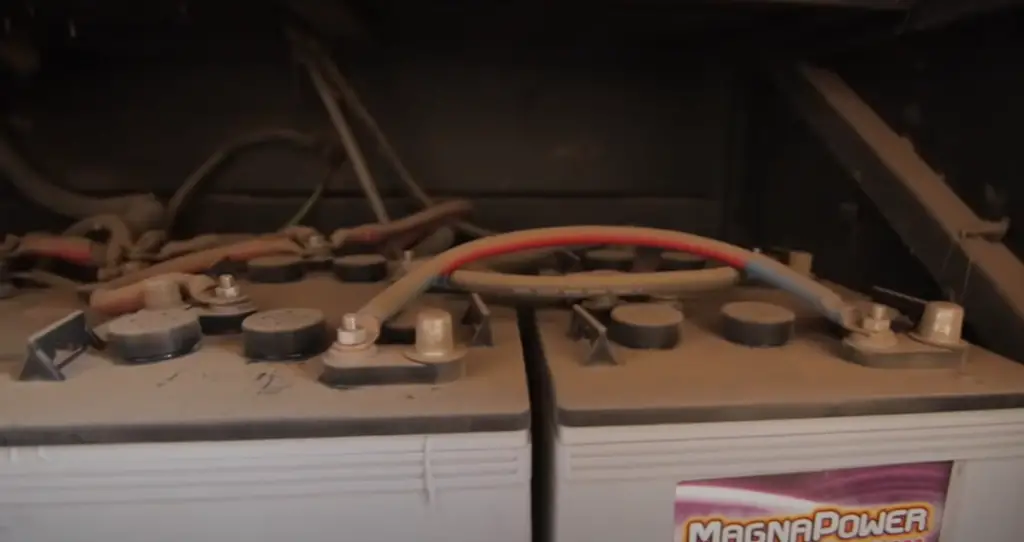
Overcharging/Undercharging
Your travel trailer battery needs to be charged correctly. Overcharging or undercharging can damage the battery and can potentially cause it to run off. Make sure you have the right charger for your battery, avoid leaving it connected to a power source for too long. Make sure you monitor the battery level to keep it from being overcharged or undercharged. [3]
Extreme Temperature
Heat and cold can affect battery life. High temperatures can cause batteries to overheat and shorten their lifespan. On the other hand, cold temperatures reduce their ability to dispense power, reducing the capacity of your battery. Make sure your battery is installed and stored in a cool, dry place to keep it in good condition.
Wiring Issues
The wiring in your travel trailer is responsible for charging and providing power to your battery. Damaged wiring can result in your battery running off. Regularly inspect the wiring in your travel trailer and look out for signs of wear and tear. If you notice any damage or have issues, it’s best to take your trailer for repairs to ensure the wiring is in top shape.
Your travel trailer battery is one of the most important components of your travel trailer. Without it, you won’t be able to enjoy the comfort and convenience it provides. However, there are several reasons why your battery may run off, and it’s essential to know what they are so you can prevent it from happening. By staying vigilant and taking proactive measures, you can give yourself a better chance of enjoying your trip without encountering battery troubles. Remember, prevention is always better than cure.
Tips and Tricks for Maintaining the Battery in a Travel Trailer
A travel trailer offers a great way to explore new places and enjoy the great outdoors. However, it’s important to make sure that your travel trailer is properly maintained before heading out on your adventure. One of the most important parts of your trailer is the battery, which powers everything from the lights to the water pump. If you want to make sure your trailer is ready for your next trip, then it’s important to know how to maintain your battery. Here are some tips and tricks to help you keep your battery in top shape.
Tip 1. Check Your Battery Often
One of the best ways to maintain your trailer’s battery is to check it often. Make sure to test the battery voltage regularly to see if it is fully charged. You should also look for signs of corrosion or damage to the battery. If you notice any issues, then it’s time to replace the battery.
Tip 2. Use a Battery Monitor
A battery monitor is a great tool to have when you’re on the road. It allows you to keep track of your battery’s level of charge, so you can avoid getting stranded without power. Just make sure to check the monitor regularly so you know when it’s time to recharge the battery.
Tip 3. Charge Your Battery Properly
The best way to keep your battery fully charged is to use a quality battery charger that is designed for your specific battery type. It’s also important to avoid overcharging your battery, as this can reduce its lifespan. If you’re not comfortable charging the battery yourself, then consider getting a professional to do it for you.
Tip 4. Store Your Battery Correctly
When you’re not using your trailer, it’s important to store your battery in a cool, dry place. You should also make sure to disconnect the battery before storing it, as this will prevent it from discharging. If you’re going to be storing your battery for an extended period of time, then it’s also a good idea to recharge it every few months to keep it in top shape.
Tip 5. Avoid Overusing Your Battery
Finally, it’s important to avoid overusing your battery. This means being mindful of your energy usage and turning off appliances when they’re not needed. You should also avoid leaving lights or other electronics on overnight, as this can quickly drain your battery. By being conscious of your energy usage, you can extend the life of your battery and avoid unnecessary replacements.
Taking care of your travel trailer’s battery is essential if you want it to last for years to come. By following these tips and tricks, you can keep your battery in top shape and avoid unexpected breakdowns on the road. So, if you’re planning your next adventure, make sure to give your battery the attention it deserves and enjoy your travels to the fullest.
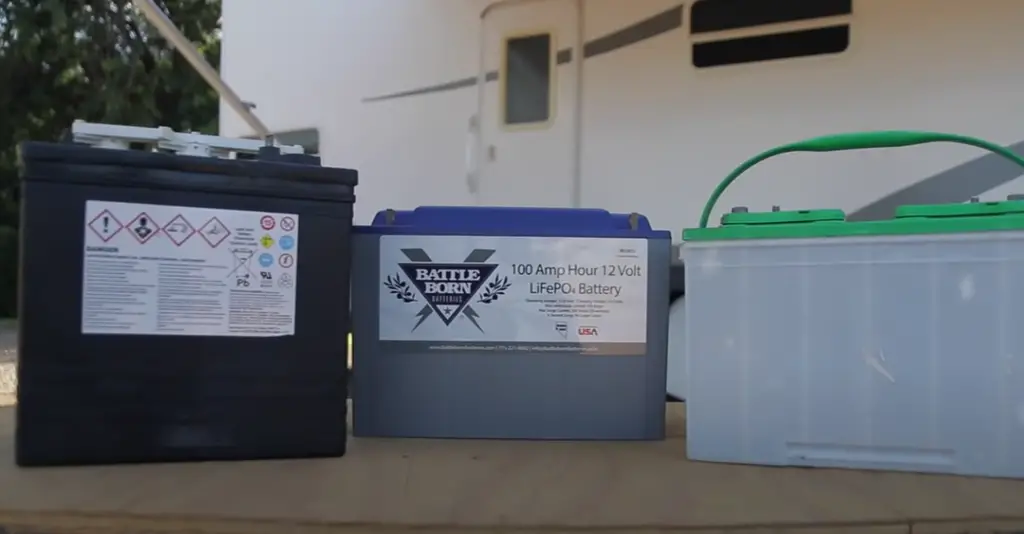
FAQ
What does the camper use the battery for?
Your camper’s battery is used to power everything from interior and exterior lights to water pumps and exhaust systems. In general, the battery is used to power the elements of your RV that make your stay as comfortable and convenient as possible. While the specific usage can vary between the type and size of an RV, campers primarily use the battery to run the 12V systems of their RVs.
What runs off 12V in a camper?
Many campers run on a 12-volt system, which is powered by a single or multiple deep-cycle batteries. Everything that runs on electricity in your camper, like lights, fans, and water pumps, is powered by this 12V system. While some newer models might have 120V outlets (like those in a standard household), most of the appliances and systems in most RVs run off this 12V setup.
Does a travel trailer battery charge while driving?
Yes. Travel trailer batteries should charge while driving. Many travel trailers have a built-in charger that will charge the battery while you drive. If your trailer doesn’t have a built-in charger, you can add one at an RV service center. Alternatively, you can use an external charger. If you’re unsure how to charge your RV battery, consult the owner’s manual or an RV professional.
Are campers 12V or 24V?
Most of the RVs have a 12V system, while some of the larger coach-style motorhomes may use a 24V system. The 12V system works perfectly fine for most RVers’ day-to-day needs. A 24V system is often featured in more significant rigs to ensure ample power and distribution of electricity to the required components.
Useful Video: RV Batteries What You Need To Know.
Conclusions
A battery is a vital component in a travel trailer, and it’s essential to know what systems rely on it. Always ensure that your battery is fully charged, and you have backup power sources such as solar panels or generators. Understanding what runs off the battery in a travel trailer will not only ensure that you have a comfortable trip, but it will also prolong the battery life.
References:
- https://koa.com/blog/what-you-need-to-know-about-your-rv-batteries/
- https://lithiumhub.com/choosing-the-right-travel-trailer-battery-the-basics/
- https://rvlife.com/why-does-my-rv-battery-keep-dying/

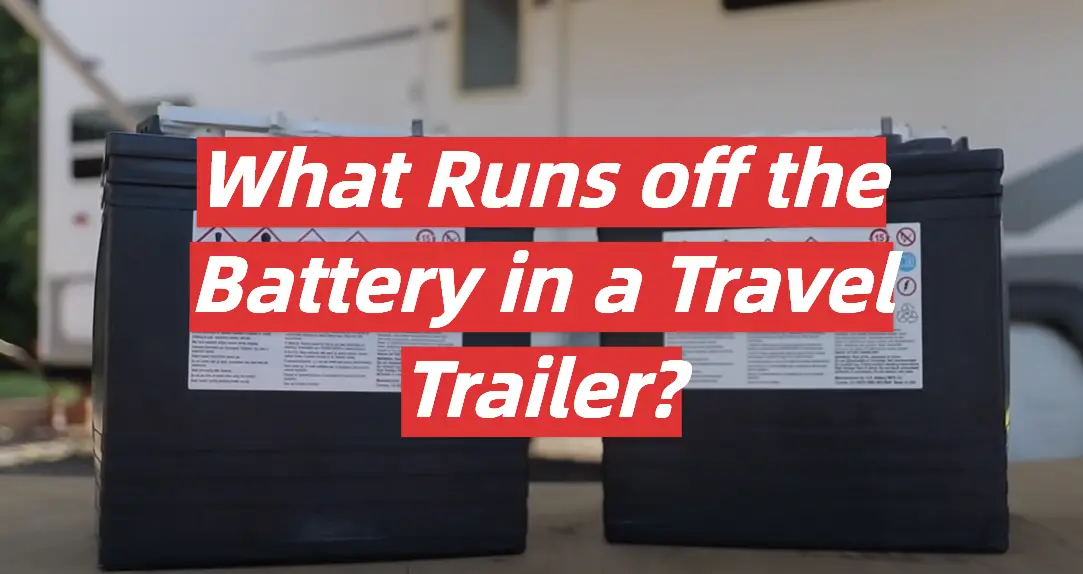

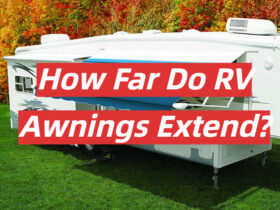


Leave a Reply